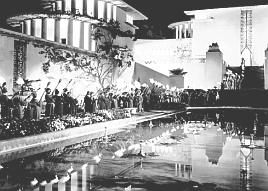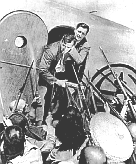RESTORATION // LOST HORIZON (1937) |
Paradise Found
|  |
|
Produced in 1937 on a staggering $3 million budget (which was particularly extravagant for Columbia Pictures at that time), LOST HORIZON was a romantically-envisioned epic which covered a lot of ground from James Hilton's bestselling novel, but the book's status didn't ensure success for the film. The original 132-minute version of the movie played in only three markets; the rest of the United States saw a 123-minute cut, when Columbia thought a shortened picture would play more often and make more money. [In fact, it wasn't until 1941 that the film made back its cost.]
The restoration of any film is difficult; it is particularly so with older titles when studios have neither cared for the negative (LOST HORIZON's original nitrate negative had long ago decomposed), nor saved interpositives, outtakes and other materials. The American Film Institute, which has successfully spearheaded drives to preserve films for future generations, began a search in 1973 for all versions of LOST HORIZON in existence around the world, in the hope that all could be combined into one, definitive version. The complete 132-minute soundtrack was found at the British Film Institute, so with all materials relocated to UCLA, former AFI employee Robert Glitt set upon the task of combining the various versions. 125 minutes of footage (some blown up from a 16mm Canadian print) were matched to the soundtrack. Substituting for footage not recovered were stills and outtakes, a procedure used effectively in the recently restored A STAR IS BORN. The results of this time-consuming and detailed work is that of a film reborn. While the plot will be familiar to those who have seen the cut versions, the restored sequences do add immeasurably to the character development. Lovett and Barnard (played by Edward Everett Horton and Thomas Mitchell), two opposites teamed as comedy relief, are given reasons for the changes which take place in their characters during their stay at Shangri-La. The role of Gloria, a consumptive prostitute, is also fleshed out. Most helped by the restored materials, however, is Ronald Colman's Robert Conway, a dignitary disillusioned with the world. In this version he embraces the philosophies of the High Lama, whereas in the shortened film the wisdom of Shangri-La was thust upon him. LOST HORIZON is now, as it was long ago, a tale not so much about Utopia as it is about inner peace. |
copyright 1987, 2009 by David Morgan
All rights reserved.







